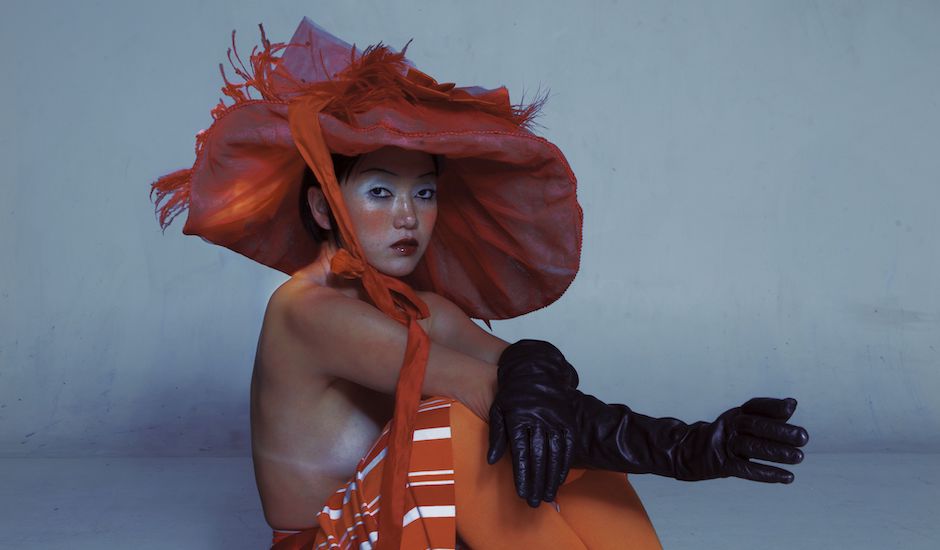 Premiere: Meet BVLLVDS, who brings darkness with AS ABOVE SO BELOWThe multi-disciplinary Korean/Australian artist brings something incredibly unique with her latest track.
Premiere: Meet BVLLVDS, who brings darkness with AS ABOVE SO BELOWThe multi-disciplinary Korean/Australian artist brings something incredibly unique with her latest track.

Album Walkthrough: Rainbow Chan details her innovative new album, Pillar
She'll be launching the album with dates across the east coast this August.
Header image by Hyun Lee.
Over the last six years or so, Rainbow Chan has grown to become one of Australian music's most treasured songwriters. Her evolution and experimentalism as a singer/songwriter/producer has allowed her to blossom into a name consistently ahead of the curve (if she's not defining said curve), presenting something unique and thematically rich with every endeavour. Since 2013's Long Vacation, this innovation has been at the forefront of her work. On singles like 2016's double-punch Nest and Last, she warped twinkling keys and subtle electronic roots with lush vocals that came to define her 2016 debut album Spacings, and on her long-awaited sophomore record Pillar - out now independently - she's doing it again.
Pillar is an album that tracks Rainbow Chan's path of evolving artistry, placing her daring songwriting and pop-infused approach to electronica front and centre as the album rises and falls through its musical valleys. There are high moments, when Rainbow Chan's experimentalism with the dance music becomes fleshed out and dominative - like the warping beats of CSR and Love Isn’t Easy, where her club roots become one with her refined, pop-centric songwriting. At the same time, however, there are moments more stripped away and minimalistic, in which her songwriting shines as it proves itself incomparable to much of Australian dance music at the moment (take the album's echoing closing moment, Roof).
"Pillar is a record about movement," she explains on the album. "With movement, comes change. With change, comes a multiplicity of truths. These ten songs were written amongst a constellation of languages, times, locations and lives, further exploring my East-Asian heritage with songs flowing effortlessly between English, Mandarin, Cantonese and Weitou (Cantonese dialect), as a way to de-centre the Eurocentricity of language in pop music."
There's a lot to dissect within the album and its rich themes, so while you dive into the record before a run of east coast album shows this August, take a read of a track-by-track album walkthrough from Rainbow Chan herself, who details the making of the album and more one song at a time. Check it all out below:
Pillar is a record about movement. With movement, comes change. With change, comes a multiplicity of truths. These ten songs were written amongst a constellation of languages, times and geographies. Learning a disappearing dialect with no future use provokes radically different feelings to picking up a language for work or leisure. The concept of time to my young niece means something else entirely to my grandmother. Home isn’t a single place. Bodies heal themselves. As a Hong Kong person living in Australia, I see my work as part of a wider conversation about the lived and imagined experiences of diasporic communities. While Spacings felt insular, Pillar feels expansive. I hope some of these stories will resonate with you.
Oblivion
Initially, the backing track for Oblivion was performed entirely on saxophone. As soon as I incorporated the beat, however, the horns didn’t make sense anymore. The song suddenly took on another life, with existing layers fading away and being reincorporated into other elements. I feel this constant redefinition of self is very similar to falling in love. There’s a line in the song which goes, “the push and pull between us, is that thing love in our changing boundaries?” I learnt to let go of initial expectations and deleted the saxophones. Yet the rest of the song wouldn’t have existed without them. Love is a bit like that.
CSR
I wanted to write a dance-floor banger which celebrated a cross-cultural aesthetic, flowing between English, Cantonese and Mandarin. What I love about club culture is the universality of the beat and the way it transforms us into a heaving mass. Half sung, half spoken, I wanted the verses to embody the “cool” nonchalance we front when we’re interested in someone. But after the facade is broken, we become a bit gooey, hence the la-la-las.
Pillar
Sometimes I like to work with limitations as it forces you to think creatively and accept imperfections. The languid, eerie groove came out of a live loop that I made on the saxophone. By using my loop pedal instead of working on the computer, I only have a certain degree of control over the recorded material as I can’t undo the layers. Storywise... not to get too specific here but over the last few years, I’ve learnt to deal with my anxiety with more kindness. Trauma lives on in your body in numerous ways, so Pillar is a personal attempt to summon and expel those troubling memories. It was the final song I wrote for the album and felt like an apt ending for my writing process.
For A Long Time
For those who aren’t familiar with my other moniker Chunyin, I also make really fast, rhythmically complex club tracks. Probably one of the more abstract productions on the album, I wanted to capture the frenetic energy at the core of eager anticipation. What that desire entails is completely up to you. The lovely, woody percussive sounds on FALT come from the Ensoniq ESQ-1. This vintage synth (sold to me by my friend/awesome Sydney producer Mohi) has become a staple in my music. Fun fact, it can be heard throughout Last on Spacings too.
Love Isn’t Easy feat. MOLDY
MOLDY is a rapper from Seoul who is a part of alternative music collective, Grack Thany. I’ve been following him for a while and really dig his flow, as well as the gnarly beats that accompany his rapping. When I got in touch with him on IG to feature on Love Isn’t Easy, he sent over his part literally the next day! Top marks for efficiency. I love the contrast between the bold urgency in MOLDY’s verse and the sinewy, snake-charmer melody of my choruses.
Melt
Recently, I realised there are many parallels between losing yourself to a bad romance and assimilation. You find yourself mimicking some other ideal, blaming yourself, downplaying successes, doing hurtful things like this to yourself in order to appease someone else. What makes power so complex is the fact that we internalise beliefs that were never ours to begin with. Social constructs are repeated fictions, an idea which is symbolised by the repetitious nature of the chorus in Melt. In the final refrain, I wanted to point out that losing agency in an unequal world is devastating - but it’s also not your fault.
A Horizon
I was staying at a family friend’s place in Taipei and recorded all the vocals for this track on my phone under a blanket. I love the gritty, lo-fi nature of sketches that come out of free music-making apps. There’s an immediacy in the creative process, which is less likely to happen in a studio setting. In one of my favourite songs by Wong Faye, titled Wo Yuan Yi, she says that she’s willing to do anything for her lover - even be banished to the horizon. I wonder if there’s a whole community of banished souls at the horizon feeling togetherness in their loneliness?

Lull feat. Chui Ping & Choi Lin
Lull sees me reimagine a lullaby from the Weitou language, a dialect spoken by indigenous Hong Kong people. My mum, Chui Ping, is a Weitou woman - she can be heard in the phone recording at the start, alongside my aunty Choi Lin and myself. Weitou culture is an important relic of rural Hong Kong, but due to social pressure to modernise in the 60s, it is not widely known. Dialect was replaced by Cantonese, farms became shopping malls, and Weitou voices were omitted from the colonial narrative. While men were taught to read and write, women shared knowledge through song. But this practice is disappearing as elders are passing away with no one to continue the tradition. Rather than seeing the Weitou lullaby as a sedative, I see it as a reawakening. Learning this folk song and reworking it into a euphoric club track, I hope Lull not only ignites curiosity in the listener but brings female histories to the fore.
Gaosuwo
Gaosuwo meaning “tell me” is the first song I’ve written in Mandarin. It looks back on the ashes of a romance and asks if the love was ever real. I have a strong admiration for people who can write lyrics in tonal languages as I found it really challenging. Your melody has to follow the pitches of the language so you kind of have to write both the words and music simultaneously. GSW features noisy textures and a metallic bassline on the Moog Realistic Concertmate MG-1, a small but powerful synth which I stumbled across in a second-hand music shop. One of my best finds to date.
Roof
Mum’s message at the start of the song is about a Chinese poem that my parents often recite. The poem illustrates the struggles of two birds who work tirelessly to feed and nurture four young chicks. When the babies are strong enough to fly, they leave the nest without looking back once, causing the parents much sadness. Roof is not only an ode to my sweet mum but is my way of looking back at all the caring mothers in my life who have come and gone.
Follow Rainbow Chan: FACEBOOK
 Premiere: Meet BVLLVDS, who brings darkness with AS ABOVE SO BELOWThe multi-disciplinary Korean/Australian artist brings something incredibly unique with her latest track.
Premiere: Meet BVLLVDS, who brings darkness with AS ABOVE SO BELOWThe multi-disciplinary Korean/Australian artist brings something incredibly unique with her latest track.
 Premiere: Deer and Marcus Whale join forces for Hold Me DownThe Melbourne producer continues to blossom after teaming up with Genes for a big return earlier this year.
Premiere: Deer and Marcus Whale join forces for Hold Me DownThe Melbourne producer continues to blossom after teaming up with Genes for a big return earlier this year.